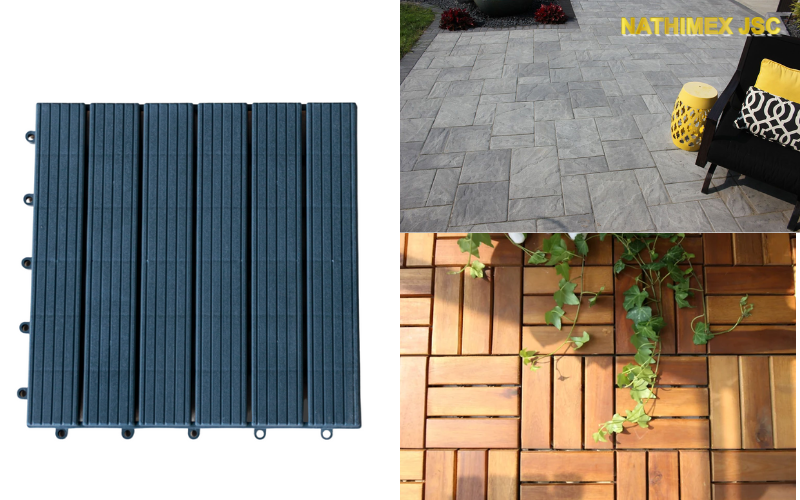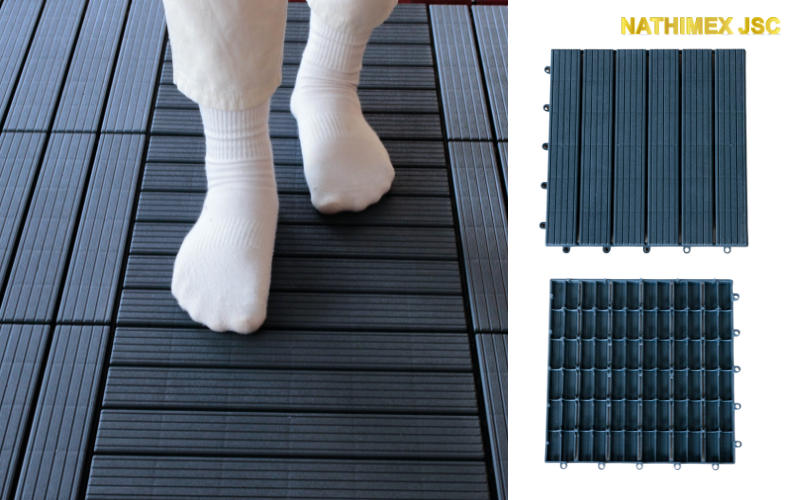Plastic deck tiles are a popular alternative to traditional decking materials. They are made from a variety of recycled materials, such as plastic and wood fiber, which makes them eco-friendly. Plastic deck tiles come in a variety of colors and designs, making them a stylish addition to any outdoor space. In this article, we will discuss the benefits of plastic deck tiles, compare them to other flooring materials, and provide tips on choosing the right flooring material for your needs.

Plastic Deck Tiles
Plastic deck tiles are made from a combination of plastic and wood fiber. They are easy to install and can be laid over any flat surface, such as a concrete patio or a wooden deck. Here are some benefits of using plastic deck tiles:
-
Durability: Plastic deck tiles are durable and can withstand heavy foot traffic, extreme weather conditions, and harsh chemicals. They are resistant to stains, scratches, and fading, making them a long-lasting investment.
-
Easy installation: Plastic deck tiles are easy to install and do not require any special tools or equipment. They come in interlocking designs, which means they can be snapped together and laid out like puzzle pieces.
-
Low maintenance: Plastic deck tiles require minimal maintenance. They do not need to be stained or sealed, and can be cleaned with just soap and water.
-
Water-resistant: Plastic deck tiles are water-resistant, which means they will not warp or rot when exposed to moisture. This makes them an ideal choice for outdoor spaces that are prone to rain or humidity.
-
Cost-effective: Plastic deck tiles are more cost-effective than traditional decking materials, such as wood or stone. They are available in a range of prices, so you can choose a style that fits your budget.

Other Flooring Materials
When choosing a flooring material for your outdoor space, there are many options to consider. Here are some comparisons between plastic deck tiles and other popular flooring materials:
Comparison to natural wood decking:
-
Cost: Natural wood decking is more expensive than plastic deck tiles, especially if you choose exotic hardwoods.
-
Maintenance: Natural wood decking requires regular staining and sealing to prevent rot and decay. Plastic deck tiles require minimal maintenance and do not need to be sealed or stained.
-
Durability: Natural wood decking is prone to rot and decay, especially in areas with high moisture levels. Plastic deck tiles are resistant to rot and decay and can withstand harsh weather conditions.
-
Water-resistance: Natural wood decking is not as water-resistant as plastic deck tiles and can warp or rot when exposed to moisture.
-
Eco-friendliness: Plastic deck tiles are made from recycled materials and are an eco-friendly alternative to natural wood decking.
Comparison to stone or concrete pavers:
-
Cost: Stone or concrete pavers are more expensive than plastic deck tiles, especially if you choose high-end materials.
-
Maintenance: Stone or concrete pavers require regular cleaning and sealing to prevent stains and damage. Plastic deck tiles require minimal maintenance and do not need to be sealed or stained.
-
Durability: Stone or concrete pavers are durable and can withstand heavy foot traffic and harsh weather conditions. Plastic deck tiles are also durable but may not be as strong as stone or concrete.
-
Water-resistance: Stone or concrete pavers are water-resistant and will not warp or rot when exposed to moisture. Plastic deck tiles are also water-resistant and are an ideal choice for outdoor spaces that are prone to rain or humidity.
-
Aesthetics: Stone or concrete pavers offer a natural and elegant look, while plastic deck tiles come in a variety of colors and designs.
Choosing the Right Flooring Material
Choosing the right flooring material for your outdoor space depends on several factors. Here are some things to consider:
-
Budget: Consider how much you are willing to spend on your outdoor space. Plastic deck tiles are a cost-effective option, while natural wood decking and stone or concrete pavers can be more expensive.
-
Maintenance: Consider how much time and effort you are willing to put into maintaining your outdoor space. Plastic deck tiles require minimal maintenance, while natural wood decking and stone or concrete pavers require more upkeep.
-
Aesthetics: Consider the look and style you want to achieve in your outdoor space. Plastic deck tiles come in a range of colors and designs, while natural wood decking and stone or concrete pavers offer a more natural look.
-
Environment: Consider the climate and environment in which you live. Plastic deck tiles are water-resistant and ideal for areas that receive a lot of rain or humidity. Natural wood decking may be prone to rot and decay in areas with high moisture levels, while stone or concrete pavers can be hot and uncomfortable in areas with high temperatures.
Pros and Cons of Each Option
-
1. Plastic deck tiles
Pros: Cost-effective, easy to install, low maintenance, water-resistant, eco-friendly.
Cons: May not be as durable as natural wood or stone, may not offer a natural look.
-
2. Natural wood decking:
Pros: Offers a natural and elegant look, and can increase the value of your home.
Cons: Expensive, requires regular maintenance, may not be as durable or water-resistant as other options.
-
3. Stone or concrete pavers:
Pros: Durable, water-resistant, offers a natural look.
Cons: Expensive, requires regular maintenance, can be uncomfortable in high temperatures.
How to Make an Informed Decision
As an informed decision, consider your budget, maintenance needs, aesthetics, and environment. Look at samples of each flooring option and read reviews from other homeowners to see how each material holds up over time. Talk to a professional contractor or flooring specialist to get advice on which option is best for your specific needs.
Conclusion
Plastic deck tiles are a cost-effective and durable alternative to traditional decking materials. They are easy to install, require minimal maintenance, and come in a range of colors and designs. When choosing a flooring material for your outdoor space, consider your budget, maintenance needs, aesthetics, and environment. Look at samples and talk to a professional to make an informed decision.
